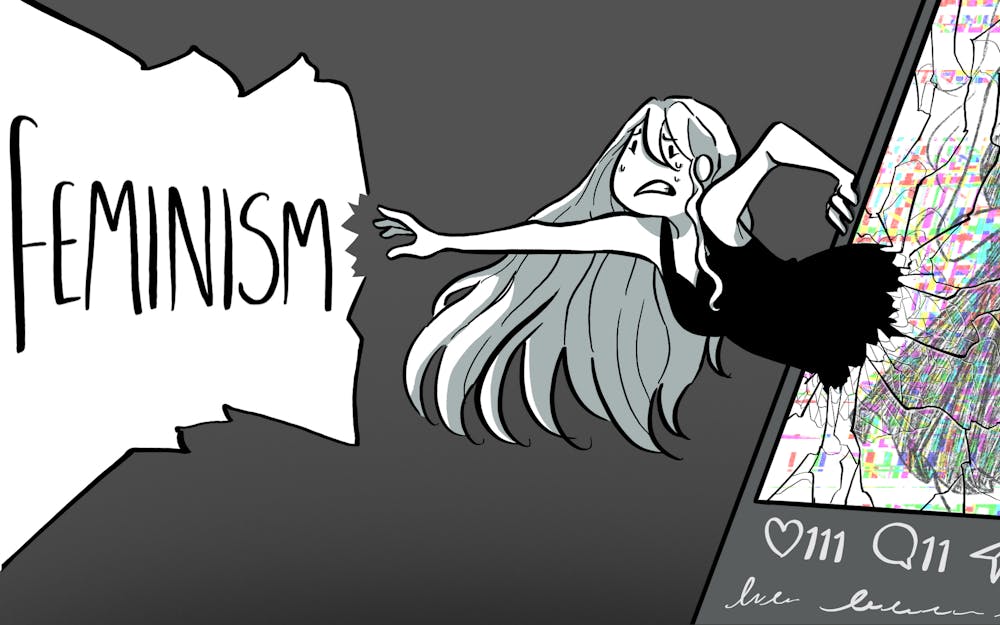Feminism isn’t just a hashtag or slogan — it’s about taking real action to make meaningful change. As a society, we talk about equal opportunity, but reality often falls short. As long as gender disparities persist, we must bridge the gap between empowerment and empty words by focusing on the tangible impacts of feminism that can transform lives.
Despite centuries of progress, gender inequality remains stark in the U.S. In 2020, a Pew Research Center survey revealed that 61% of U.S. women consider themselves feminists. Yet many women still experience systemic barriers to equal treatment. While feminism is empowering for many, the gap between rhetoric and reality continues to affect women’s access to education, economic opportunities and healthcare.
Empowering women starts with education. Quality education equips women with the knowledge and skills to challenge stereotypes, engage critically with societal norms and shape their futures.
In 2019, I taught personal safety to underprivileged girls. It was a pivotal moment when I realized how unaware many of these girls were about their own bodies — a foundational aspect of understanding oneself. For them, concepts like mental health seemed distant, reserved for those with fewer immediate struggles. This experience highlighted how many girls grow up internalizing discomfort and societal expectations, often feeling that their needs are secondary.
Education, in this sense, is crucial. By giving women and girls the tools to understand their rights and what they’re entitled to for their well-being, we empower them to prioritize their needs and health. We empower them to advocate for themselves and others. According to a 2017 Global Education Monitoring Report, educating girls can reduce child marriage rates by 64% and increase their ability to participate in political and economic spheres. Education is the key to unlocking women’s potential and bridging the gap between talk and action. Economic empowerment is another vital part of this journey. Equal pay, access to career advancement and opportunities for entrepreneurship are essential to bridging the gender gap. According to the World Economic Forum, it will take another 267 years to close the economic gender gap if current trends continue. The impact of this inequality is widespread, affecting women’s ability to support families, build wealth and contribute to economies.
My experience teaching personal safety to underprivileged girls in 2019 made me realize that true empowerment goes beyond just breaking stereotypes; it’s about breaking cycles of poverty and inequality by providing real opportunities. Seeing how many of these girls lacked basic knowledge about their bodies and their rights, I understood that empowerment must address the roots of economic and social barriers they face. For example, initiatives like microloans enable women to start businesses and achieve financial independence, which can break the cycle of poverty in their families. Similarly, leadership development programs in the workplace help women advance into executive roles, ensuring that they’re represented in key decision-making positions. Empowerment isn’t just about changing mindsets it’s about creating pathways for women to reshape their futures
What can you do? Simple actions can make a big difference. Start by learning more about feminism — read books, attend workshops or join local feminist groups. Have open conversations with friends, family and colleagues about gender equality. Support women-led businesses, advocate for equal pay in your workplace and mentor young women in your field. By taking these steps, you can contribute to a more inclusive world.
Gender equality isn’t solely a women’s issue; it requires the active participation of men as allies. Men can advocate for equal pay in their workplaces, ensuring women have a seat in important discussions. Even as college students, men have many opportunities to be allies in advancing gender equality. They can start by calling out sexist jokes or language in social settings, which helps create a more respectful environment. In the classroom, men can support their female peers by encouraging them to voice their ideas and by ensuring they aren’t talked over during discussions. Joining or supporting campus organizations focused on gender equality—like Women in Business or similar initiatives—demonstrates commitment to allyship. Men can also be mindful of sharing resources and opportunities, such as inviting women to networking events or study groups, ensuring equal access to professional development. By taking these small but impactful steps, male college students can contribute to a culture of inclusivity and set a foundation for advocating gender equality in their future careers Men have a critical role in advocating for gender equality and challenging discriminatory behaviors. The feminist movement will succeed when men and women stand together as equals in the fight for a more inclusive future.
Feminism is about more than words—it’s about action. As people, we must work collectively to bridge the gap and empower women in every sphere of life. According to the World Economic Forum, at the current pace, it will take over 130 years to close the overall global gender gap . This statistic alone should ignite a sense of urgency for real change.
As I reflect on my journey, from teaching young girls about personal safety to organizing feminist initiatives like IU’s Women’s Wellness Fair, I realize how each experience has shaped my dedication to gender equality. Starting with grassroots efforts in education, I moved into broader initiatives aimed at breaking stigmas and building supportive communities. These experiences, from the early days of hands-on teaching to today’s advocacy and leadership roles, have deepened my belief in empowering others to advocate for themselves.
My work now focuses on inspiring others to take the lead in fostering inclusivity, resilience, and real change. The journey to gender equality requires dedication, but the rewards are immeasurable. Together, we can bridge the gap and create a future where gender equality is not just an aspiration but a reality.
Aryaa Mishra is a sophomore studying marketing and business analytics with a double major in economic quant methods.






